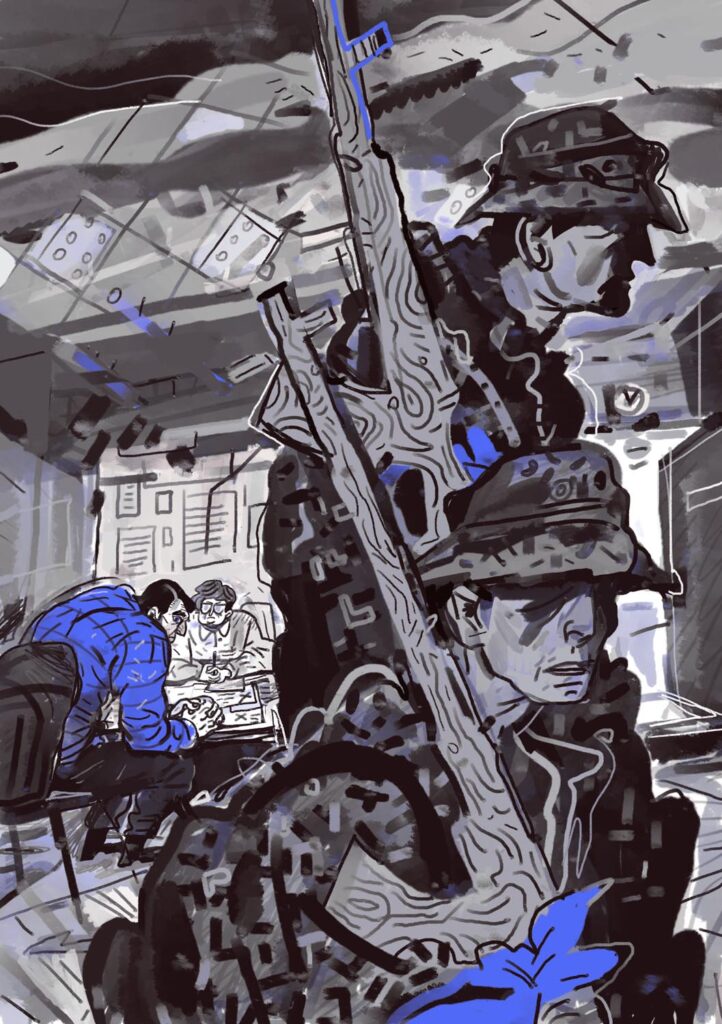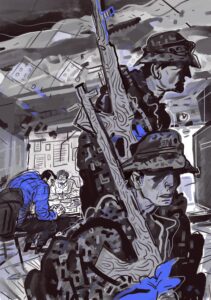“I am very capable, I am just a little tired”
Mykhaylo is not yet 60. Under martial law, he is eligible to serve in Ukraine’s armed forces.
“I’ll give it my best shot,” he says.
The man has problems with his legs, and can barely get to the conscription office. Mykhaylo tries to hide this when he gets to his destination—unsuccessfully.
“Name. Age. Call-up letter,” a secretary asks. We are in the local conscription office. This is the first stop on your way to the war zone: you show your documents and then are sent to train or to fight. Every citizen who meets certain criteria is called up.
Mykhaylo was not. He showed up as a volunteer.
“No letter? We only accept those who received one. We will let you know if we need more men,” the secretary says.
“But see, I am a good mechanic! My son is fighting already, and I want to go, too.”
The woman, a little impatient now, inspects Mykhaylo.
“Sir, we’re only accepting people with combat experience. We cannot accommodate every volunteer.”
Mykhaylo shrugs: I see defeat in his eyes.
“Listen, it is admirable that you want to join,” the woman says, her voice kinder. “It’s just we got so many volunteers in the first days of the war and we don’t have enough gear and weapons. We don’t even know how to transport all of them safely.”
“I ask you to stay here and do what you can to help,” she continues. “We always need mechanics on the ground.” She produces a little smile before waving Mykhaylo off.
“Well, at least I tried,” Mykhaylo says as he manages a nervous chuckle. We leave the building and are walking back now: Mykhaylo insists on going on foot.
“I am very capable, you know,” he says, “I am just a little tired.”
Mykhaylo lied about being a good mechanic, and I know it. He told me earlier that he has not worked in years, because his main responsibility was taking care of the house and a little garden he has in a small suburb in the Lviv region, in western Ukraine. And even before that, he mostly farmed.
But things have changed for this short, chatty blond man in his late fifties.
After years of suburban calmness, he wants to fight.
“My son is there. What am I, worse?” he says, half-jokingly.
Well, this is not an ultimate no,” I try to reason with him. “They might need more people, right? And you can always do something here.”
Mykhaylo nods, but we both know this is only half the truth.
There are already too many volunteers in Malekhiv, this quiet town 50 kilometres away from Lviv, the largest western Ukrainian city.
I secretly hope that we will not come to the point when Ukraine calls on more men, and that this outburst of national courage will not need to be tested.
“They don’t want to sit and wait anymore”
Nataliya is 50. She has two sons, both in their twenties, both married, and both with young sons. Her large family all lives in Stryi, a pretty little town in western Ukraine. It is about a two-hour drive from the Polish border, and one hour to Lviv, the regional capital.
Every other week, Nataliya works as a nanny in Kyiv. She was supposed to leave for the capital two days before the war started. However, her employer cancelled at the last minute: the parents got sick and were staying at home, so they asked her to come later.
“Thank God I did not go. Can you imagine me running around Kyiv trying to get into a train?” she tries to joke.
When the war started, her daughters-in-law fled to Poland with their children. Both have family there. A week later, they both came back.
“Yulik, my oldest grandson, hated it. He could not sleep in a new place, and he missed me too much,” Nataliya says. Before the war, she was the one usually putting Yulik to sleep.
“I don’t know why they decided to go right away, but maybe they were too scared for the kids,” Nataliya reasons, “But I am happy they are back, even though it’s loud and tense here.”
Nataliya has no intention of going abroad, even though it would be very easy to go to Poland. Stryi is still relatively safe one month into the war—as safe as it gets in a country where missiles can strike anywhere. The town has been spared any bombardment, but the air sirens go off several times a day.
“We used to go into the basement at first, but then, we got used to it,” Nataliya waves off the danger. She is not quite indifferent to the sirens, but it is clear that she is getting used to the noise and the warnings.
“I cannot be in that basement for long anyways. I will lose my mind,” she says.
Nataliya’s sons, Rostyk and Volodymyr, signed up to the Territorial Defence Forces on the first day of war. The volunteer network defends local communities, provides intelligence, helps to provide aid and find housing for internally displaced people, and sees to other urgent matters.
Before the war, Rostyk traded used cars and Volodymyr owned a local car wash. Now, the businesses are on hold. The brothers donated their unsold vehicles to the Territorial Defence Forces and focused on volunteering, delivering aid and driving people to the border.
“They are growing more restless by the day,” Nataliya sighs. “They want to do something more important. They feel like anyone could do what they are doing.”
Thousands of Ukrainians are experiencing this challenge: there are too many volunteers and too few weapons.
“I registered at the local conscription office,” Rostyk, a plump yet sturdy man of 25 says to me, “But I don’t think they will call.”
His voice sounds annoyed, almost bitter, as if sitting here, in his mother’s kitchen were some sort of punishment. Nataliya gives me a sneaky look as to say: “Didn’t I tell you how annoyed they were?” But she stays silent, sipping her tea.
Volodymyr, the eldest son, calls on his mom almost daily now. He enters the kitchen as I am trying to stir a conversation with Rostyk. I am not very successful, so Volodymyr’s arrival gives me another chance.
“Just drove a Tajik family to a college dorm,” Volodymyr says after a brief greeting, “They want to go to the border tomorrow. Will you take them?”
Rostyk nods.
As Nataliya makes tea for Volodymyr, silence reigns once again. The brothers do not feel like talking.
When Russia annexed Crimea in 2014 and started a war in Donbas, in the east of Ukraine, Natalia was terrified that one of her sons may be conscripted to fight there. Now, the mood is completely different.
“They should have trained when they had a chance,” says Nataliya’s husband, also called Volodymyr. “But now, who needs a soldier who’s never seen a tank?”
A chubby man of 50, he seems the least concerned of the group.
“Aren’t you worried about your sons?” Nataliya gives him an angry look.
“Worried? Why? They are finally growing into men. Should I be worried that they have enough sense to protect their country?”
Nataliya does not answer. It looks like she is debating whether to contradict her husband or agree. She chooses the latter. “I just wish it did not have to be like this,” she sighs.
“And I just wish we had better soldiers than these two,” Volodymyr smiles, winking at me.
“He left angry, but at least I didn’t cry”
Business is not going well. Nadia has been in her store for a few hours, but she has not sold anything. The woman owns a small clothing shop in Novyi Rozdil, a town in the Lviv region. The shop is inside a large local market.
Despite a big influx of arrivals, most of them do not shop for clothing.
“We get internally displaced people from all over Ukraine, but they don’t need to buy clothes: locals donate everything,” Nadia explains.
Although this is not good for her business, she is proud of the help her town is giving to Ukrainians in need.
“We’ve collected lots of food and warm clothing, and people also brought blankets and other things that may come in handy,” she says.
Every day, she and her daughter help at the local volunteer centre inside the Cultural Palace. The building usually hosts concerts and other cultural events; it is now a place where people make camouflage netting and sort aid that will be sent to the front.
For Nadia, helping is personal. Her husband Yura is fighting in eastern Ukraine. He is a physical education teacher in a local school. In 2014, when Russia annexed Crimea and supported a war in Ukraine’s east, he volunteered to fight.
Yura spent six years in the Donbas, defending Ukraine from separatist attacks.
In 2020, he returned to western Ukraine, although he always wanted to return to the east.
“Separatism in the Donbas was like a gangrene,” Nadia says. “It would not have existed without Russia, and as long as Russians supported it, we knew there was always a threat. Yura wanted to defeat it.”
Nadia’s husband started packing on 24 February, when Russians launched a full-scale invasion into Ukraine.
“I was upset and told him not to go, but I knew he would not listen,” the woman recalls. “Yura left angry anyway.”
Nadia supported her husband’s decision although she did not want to voice it—who wants their loved ones to risk their lives?
“At least I didn’t cry,” I hear pride in her voice. Nadia’s son is a police detective in
Stryi. He, too, wanted to go to the east, but the authorities told him to stay put.
“They still need police here, you know. We can’t have all officials leave,” Nadia reasons.
For now, the number of volunteers who have expressed a desire to fight well exceeds the number of weapons Ukraine has.
“My husband told me that he is back in the east, and that Russians destroyed a lot of their equipment,” Nadia continues.
“But it is impossible to deliver anything because Russians target all military convoys from the air.”
“Our skies are not closed, so nothing is safe. Russians can literally drop a bomb anywhere,” she adds angrily.
Nadia is referring to the fact that Ukraine does not have an Iron Dome or anything similar that could protect Ukrainians from enemy missiles. NATO refused to close the airspace above Ukraine, and it also rejected pleas for military planes. Given that Russian troops outnumber Ukrainian ones and have a large supply of munitions, it is very difficult for Ukrainians to deliver crucial supplies and military aid to the regions where they are most needed.
“And they [Russians] also use forbidden weapons, but the west seems to be okay about it,” Nadia’s voice is bitter.
The woman still opens her business every day and tries to live her life as usual—despite a constant worry for her husband. She has been an active volunteer since 2014, so this type of work is not new to her, although she admits that this time, the influx of people is unprecedented. But there are also more locals who are volunteering daily.
“I encourage all my friends and acquaintances in western Ukraine to stay here and not go anywhere. We need a strong rear, and we need to keep our economy going,” she says,
“I don’t understand those westerners who fled to Poland right away when their country needed them. If you cannot fight, there is always something else you can do.”
Nadia is visibly shaken as she says this.
Most people who flee, usually women with children, come from the most war-stricken regions. They fear for their lives and those of their loved ones.
But for Nadia, this is not a solution. “And I am mad,” she adds, “at those Ukrainians who are now hiding out in some remote villages from their war duty. Yes, it is scary, but we cannot all be scared. We should all fight the way we know how,” she concludes.
Nadia cannot talk to me anymore. She has to close the store early today because she is attending a funeral. A 30-year-old soldier, a local of the town, has been shot near Popasna, in the east of Ukraine. The fighting is the heaviest there.
“He’s younger than my daughter. Just a kid,” Nadia sighs.
She looks solemn as we are leaving the store. It is a beautiful March day: spring is very warm this year.
“I really like this town,” Nadia smiles, “I was born and raised here. And Yura and the guys are fighting to keep it this way.”
We have almost reached the church.
“Sometimes I forget how beautiful Ukraine is,” Nadia says. We look around: the church is right next to a big lake which looks magically blue in the sun.
Before I depart, Nadia gives me a slow look.
“We are where we all should be. I am working here, Yura is fighting there, and we are all doing something for Ukraine,” there is a tiny tremble in her voice, but she crushes it.
“We will never give up.”




